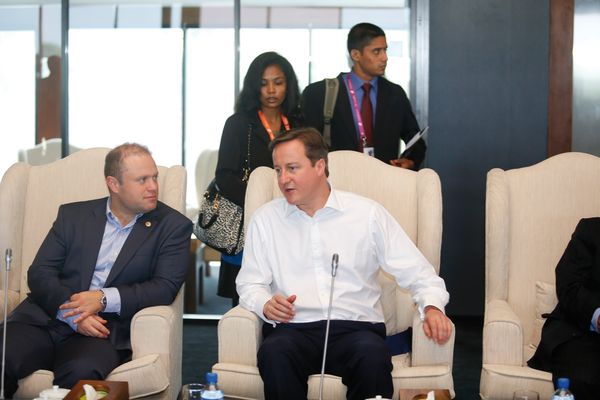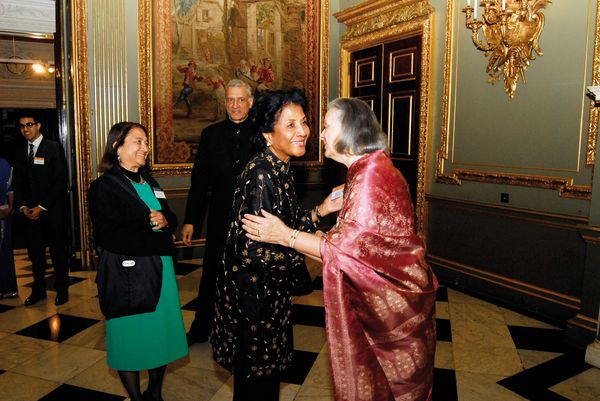Representatives of Commonwealth organisations met in London to discuss their changing relationship with the Secretariat and the Foundation – and look at funding for the future

© Kesara Ratnavibhushana
Member states should commit to doubling the amount of funding available to Commonwealth organisations, a conference in late 2014 heard, in order to ease the financial difficulties many groups are currently suffering. A change in the function of the Commonwealth Foundation, which was set up in the 1960s to encourage the formation of professional and academic associations, has meant that many Commonwealth organisations no longer receive funding from the Foundation, leaving some struggling for cash.
The conference* in London, organised by the Round Table, the Royal Over-Seas League and the Commonwealth Association, was entitled: ‘Commonwealth organisations and the Peoples’ Commonwealth: common purpose or parting of the ways?’ As well as looking at issues of funding, Commonwealth organisations wanted to know if there was a way they could work more closely with the Commonwealth Secretariat and the Foundation to influence policy and, ideally, have access to government ministers. Many associations represented at the conference felt that they had once enjoyed a closer relationship with the Secretariat and the Foundation, which they would like to re-establish following the recent restructuring at the Secretariat.
The Secretary-General, Kamalesh Sharma, responded that the Secretariat is looking to recruit two new people to the Secretary-General’s Office who will be responsible for information exchange, including promoting practical collaboration with accredited Commonwealth organisations (see ‘This doesn’t look to me like a declining Commonwealth’ on page 84). The proposal is awaiting sign-off by member states. “I see no reason why the member states will not welcome it,” added Sharma.
Once the new staff members are in place, the intention is to have a two of meetings a year between the Secretariat and each of the nine accredited Commonwealth organisations.
Carl Wright, secretary-general of the Commonwealth Local Government Forum, suggested that the Commonwealth ought to relaunch itself to re-engage citizens and governments of its member countries who might be starting to think that the Commonwealth is becoming less relevant in the 21st century.
“I have just flown in from Asia and despite polite acknowledgments, I do not detect any strong sentiment in support of the Commonwealth in places like Delhi or Kuala Lumpur,” he said, stressing that he was speaking at the conference in a personal capacity. “Here in the UK, although the current government has been more supportive than its predecessors, the public has little understanding of the modern Commonwealth.”
On a more positive note, he added that the Malta CHOGM in 2015 would be the perfect opportunity for a re-vitalisation. “I was much taken by the thoughtful address recently given in London by the Prime Minister of Malta, who, as CHOGM host, will have a key role in any re-launch. I know here in the UK, too, there is much political commitment to a revival of the Commonwealth, not least in Buckingham Palace.”
Wright also broached the idea of expanding the Commonwealth by allowing new countries to join as associate, or observer, members. “These associates/observers could benefit from all technical and know-how exchange, pay membership fees, but not be represented in the governing structures, while eventually, when the time is ripe, progressing to full membership. Perhaps this could also be a way to see the return of former members like Zimbabwe and attract new ones like Myanmar.”
As part of this organisational relaunch, he suggested that more funds could be generated for Commonwealth organisations. He stressed that he, like most others, does not distinguish between the three categories of organisations – the three inter-governmental organisations (Secretariat, Foundation, Commonwealth of Learning), the quasi-governmental associated organisations (for example, Commonwealth Local Government Forum, Commonwealth Telecommunications Organisation) and the many civil society organisations and professional bodies.
“There is no reason why more resources would not be forthcoming, either from member states or external partners, such as the EU. To create momentum, the Malta CHOGM should, however, commit to member states doubling financial resources to all Commonwealth organisations.”
Another delegate suggested that the profile of the Commonwealth could be raised with the launch of a regular radio programme where commentators from Commonwealth countries could give a view about international current affairs.
Many speakers were interested in pushing for their organisation to get access to ministers and heads of government at CHOGM.
However, Patsy Robertson, chair of the Commonwealth Association, warned other delegates that this was not practical. “I just think I need to add a note of realism,” she said, “in particular about the pressure at the Heads of Government Meeting. The whole point of the Heads of Government Meeting is for leaders, heads of government, to talk about the problems that confront them – and we’ve got lots of problems. This is the only opportunity they get to talk as a group.” She suggested that the Commonwealth People’s Forum has its meeting six months before CHOGM and then takes key messages to country leaders on behalf of civil society, rather than having its meeting during CHOGM.
“Heads of government are not taking these messages back with them and I can tell you their officials aren’t taking it back either. So if you want to have some influence with heads of government, don’t try to do it at CHOGM.”
It became clear at the conference that there was a major difference between groups that have guaranteed funding and those that don’t. Some of the membership organisations have a good income from their members on which they can rely. Others, such as the Commonwealth Journalists’ Association, only charge a small annual fee from their members and are having to work hard to find additional sources of funding. The Commonwealth Broadcasting Association (CBA) has taken the decision to drop the word ‘Commonwealth’ from its name, as that will make additional funding streams available. In 2007 the CBA received £185,000 in combined funds from the Commonwealth Secretariat and the Commonwealth Foundation. By 2012 that figure had fallen to £11,000 and now it gets nothing from either organisation. The CBA is to relaunch as the Public Media Alliance. The rebrand will also allow members from non-Commonwealth countries to have full membership and voting rights, as its work is also relevant in non-member countries.
At the other end of the scale, several speakers acknowledged that the Commonwealth Games Federation had undergone a renaissance as a result of the Glasgow Games. The recent launch of the Commonwealth Exchange was also welcomed.
In response to comments on the changing role of the Commonwealth Foundation, one delegate voiced the opinion that professional associations don’t have the standing now that they once did and that some civil society organisations based in member countries, that aren’t Commonwealth bodies as such, can often make a very valuable contribution to Commonwealth causes. The success of Malala Yousafzai and Kailash Satyarthi in winning the 2014 Nobel Peace Prize was cited as “Commonwealth civil society at its best”, despite both of them heading up organisations that are not affiliated to the Commonwealth.
Delegates also spoke about the way that organisations could potentially work together in future, possibly hiring a professional fundraiser who could work for more than one organisation or having regular meetings to share contacts and experience.
One speaker also suggested that Commonwealth organisations needed to look at other ways to modernise by utilising online petitions, for example, in the vein of change.org and Avaaz, as well as other social media to get their messages across. “I wonder whether, in fact, if Commononwealth civil society organised on a world scale, online petitions directed to all the governments, as well as the Commonwealth Secretariat, might well be a more effective advocacy and lobbying tool than these desperate last minute little chats in corridors at CHOGM.”
Most people who spoke at the conference wanted to stress the important contribution that Commonwealth organisations could make in terms of helping to deliver Commonwealth policies on the ground. One pointed out that civil society organisations could be the ‘eyes and ears’ of the Secretariat and proposed a model where the Secretariat uses Commonwealth organisations to deliver its policies on improving democracy and development, as well as asking them to reflect back to its officers what the impact has been on the ground.
Some even went as far as to question whether there was a need for the Foundation to continue to receive Commonwealth funding, now that it has moved so far from its original remit. Others called for the organisation to become more accountable.
Towards the end of the day, one speaker referred to the value of the Commonwealth ‘brand’. “Any Commonwealth body that goes out of existence, or that de-Commonwealthises itself, diminishes the Commonwealth. Similarly, if the Commonwealth is perceived as more valuable, people will wish to join and finance Commonwealth organisations.
“I do not feel that the future of the Commonwealth can be left to governments or to small intergovernmental bodies. Governments have other things to worry about – it will be left for civil society to push for the vitality and utility of the Commonwealth, using its networks to identify areas where it can make a contribution to the lives of citizens.”
Tributes were paid at the end of the conference to Sir Peter Marshall, former Deputy Secretary-General of the Secretariat, who had chaired one of the sessions. He had turned 90 in 2014, so conference delegates raised a glass to his health and enjoyed a slice of birthday cake.

‘This doesn’t look to me like a declining Commonwealth’
The Commonwealth Secretary-General’s Office will be taking on two people to liaise between the Secretariat and Commonwealth organisations “promoting practical collaboration between accredited Commonwealth organisations and individual divisions of the Secretariat”, Kamalesh Sharma told delegates.
The details are still a work-in-progress, the Secretary-General explained, but recruitment will begin soon. “At least two meetings per annum will be held by the Commonwealth Secretary-General with intergovernmental organisations,” he said, adding that there would be consultation with the relevant organisations about the arrangements in due course.
Plans are also afoot to open channels for accredited organisations to be able to articulate their concerns at ministerial meetings via written submissions that would be circulated to member governments by the Secretariat.
“These would not just be lying on a side table, it would be something that is integrated into the papers that are being handled.” The Commonwealth Connect website will be used to publish a quarterly report “of the ways in which the Secretariat has delivered on the mandate to strengthen consultations and liaison in an institutionalised way”.
Sharma also wanted to set the record straight on the way that the Commonwealth is perceived in the member countries he visits, in response to speakers who had questioned whether it is still held in the esteem it once was. He spoke of an unexpectedly large crowd that had shown up to hear him speak in the Bahamas. “They were all a young crowd, and from their questions it was very clear that they had been reading our website and were very ambitious about the Commonwealth.
“Young people are absolutely crucial and I am delighted that there are so many initiatives that are coming up. The Commonwealth Youth Council was recently reconstituted – it is the largest youth council in the world. The Commonwealth Students’ Association has been constituted and is also, I believe, the largest. We also have the most vibrant young entrepreneurs’ body in Asia, which is, hopefully, now being taken as an example for other regions of the Commonwealth. And the Youth Climate Change Network is coming up.
“This doesn’t look to me like a declining Commonwealth. It is a Commonwealth which is on the rise. We have to seize the opportunity.”





